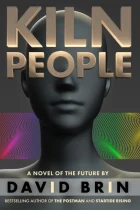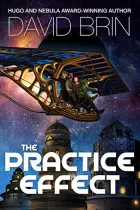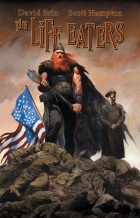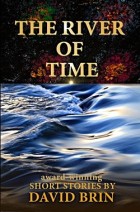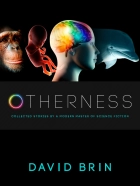Continuing this compilation (from Part 1 and Part 2) of questions that I’m frequently asked by interviewers. This time about…
==ABOUT DAVID BRIN’S BOOKS==
–Which of your own novels is your personal favorite?
 That’s like asking: Which of your children do you like best? Glory Season is my brave, indomitable daughter. The Postman is my courageous, civilization-saving son. Earth is the child who combined science and nature to become a planet. The Uplift War…well, I never had a better character than Fiben the earthy-intellectual chimp!
That’s like asking: Which of your children do you like best? Glory Season is my brave, indomitable daughter. The Postman is my courageous, civilization-saving son. Earth is the child who combined science and nature to become a planet. The Uplift War…well, I never had a better character than Fiben the earthy-intellectual chimp!
–Were you happy with the Kevin Costner adaptation of your post-apocalyptic novel The Postman?
 The Postman was written as an answer to all those post-apocalypse books and films that seem to revel in the idea of civilization’s fall. It’s a story about how much we take for granted – and how desperately we would miss the little, gracious things that connect us today. It is a story about the last idealist in a fallen America. One who cannot let go of a dream we all once shared. Who sparks restored faith that we can recover, and perhaps even become better than we were.
The Postman was written as an answer to all those post-apocalypse books and films that seem to revel in the idea of civilization’s fall. It’s a story about how much we take for granted – and how desperately we would miss the little, gracious things that connect us today. It is a story about the last idealist in a fallen America. One who cannot let go of a dream we all once shared. Who sparks restored faith that we can recover, and perhaps even become better than we were.
 Was The Postman film faithful to this? Well, despite several scenes that can only be called self-indulgent, or even goofy… plus the fact that I was never consulted, even once… I nevertheless came away more pleased than unhappy with what Costner created. Though flawed, it’s a pretty good flick – if you let yourself get into it. One that deals (a bit simplistically) with important issues and is more faithful to the book’s inner heart than I expected at any point during the long decade before it was released.
Was The Postman film faithful to this? Well, despite several scenes that can only be called self-indulgent, or even goofy… plus the fact that I was never consulted, even once… I nevertheless came away more pleased than unhappy with what Costner created. Though flawed, it’s a pretty good flick – if you let yourself get into it. One that deals (a bit simplistically) with important issues and is more faithful to the book’s inner heart than I expected at any point during the long decade before it was released.
Costner’s postman is a man of decency, a calloused idealist, not particularly courageous, who has to learn the hard way about responsibility and what it means to be a hero. The movie is filled with scenes that convey how deeply we would miss the little things… and big ones like freedom and justice. In fact, it includes some clever or touching moments that I wish I’d thought of, when writing the book.
Visually and musically, it’s as beautiful as Dances with Wolves. Kevin Costner is foremost a cinematographer, I will gladly grant him that. Rent and watch it on a wide screen.
 Would I have done things differently? You bet! In a million ways. But I didn’t have the 80 million dollars to make it, and in keeping true to the heart of the book, he earned some leeway when it came to brains. Anyway, life is filled with compromises. I’d rather look for reasons to be happy.
Would I have done things differently? You bet! In a million ways. But I didn’t have the 80 million dollars to make it, and in keeping true to the heart of the book, he earned some leeway when it came to brains. Anyway, life is filled with compromises. I’d rather look for reasons to be happy.
I have posted my full response, discussing the book and the movie, on my website: http://www.davidbrin.com/postmanmovie.html
–Are you planning on returning to the Uplift Universe?
Yes. Soon, even! Next big thing. Have a look at the Uplift Universe Web Site.
–Can you reveal some of the inspirations behind the Uplift Saga? How did you come up with the idea?
If we don’t find intelligent life in the galaxy, humanity will create it. We might contrive new entities through artificial intelligence. It could happen the American way – by encouraging more and more of us to diversify in new directions, with new interests and passions and quirky viewpoints. And of course, diversity spreads whenever we add new intelligent life forms called our children.
Then there is the idea of creating other kinds of beings to talk to through some change in the animal species that already exist around us.
 Other authors have poked at this idea before. Cordwainer Smith and Pierre Boulle and H.G. Wells. Boulle’s Planet of the Apes and Wells’s The Food of the Gods or The Island of Dr. Moreau, and all other attempts to deal with this topic did stick to just one perspective, however. Just one dire warning. They all portray the power to bestow speech being executed in secret by mad scientists, then horribly abused by turning these new intelligent life forms into slaves.
Other authors have poked at this idea before. Cordwainer Smith and Pierre Boulle and H.G. Wells. Boulle’s Planet of the Apes and Wells’s The Food of the Gods or The Island of Dr. Moreau, and all other attempts to deal with this topic did stick to just one perspective, however. Just one dire warning. They all portray the power to bestow speech being executed in secret by mad scientists, then horribly abused by turning these new intelligent life forms into slaves.
 I believe that – partly because of these cautionary tales – that’s not what we will do. Because of those self-preventing prophecies, I wanted to show something else instead. What if we try to uplift other creatures with good intentions? With the aim of making them fellow citizens, interesting people, accepting that in some ways they might be better than us? Certainly that’s worth a thought experiment too? Adding to the diversity and perspective and wisdom of an ever-widening Earth culture?
I believe that – partly because of these cautionary tales – that’s not what we will do. Because of those self-preventing prophecies, I wanted to show something else instead. What if we try to uplift other creatures with good intentions? With the aim of making them fellow citizens, interesting people, accepting that in some ways they might be better than us? Certainly that’s worth a thought experiment too? Adding to the diversity and perspective and wisdom of an ever-widening Earth culture?
Wouldn’t those creatures still have interesting problems? Of course they would! More complex and interesting than mere slavery. At least, that is what I hoped to explore.
For more on Uplift: See Intelligence, Uplift and our place in a big cosmos
===== ===== =====
==Return to Part 1: Questions about Writing and Science Fiction
or Part 2: Questions about Science Fiction and Fantasy















